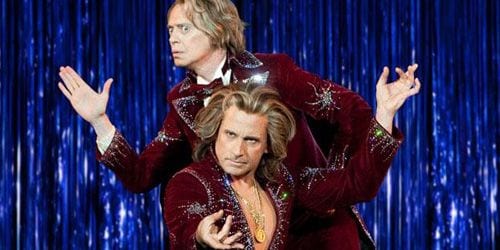
“Nobody likes you,” hisses an elementary school bully (Zachary Gordon) to little Burt (Mason Cook). Pressed up against a tree in his own yard, Burt does his best to improvise: whatever the bully does to him, well, he meant to do it anyway. He meant o eat bark, he meant to cringe and whimper. It’s not long before the bully — backed by a crew of nameless minions — loses interest and leaves, still snarling and menacing. Poor Burt heads into his home, where his mom is absent and a birthday gift awaits.
The gift leads directly to Burt’s big-haired alter ego and the movie that follows, The Incredible Burt Wonderstone. It’s a magic kit, with rings and scarves and cards, plus a videotape featuring the TV star Rance Holloway (Alan Arkin), imparting his wisdom, plus a question and answer. “Why do you want to be a magician”? He asks. “Because everyone loves a magician!” A few montage moments later, after Burt meets his lifelong partner Anthony and they come up with all manner of kidlike tricks, Wonderstone is born. He is, of course, a Vegas concoction, grown up into Steve Carell and still attended by his newly named life partner Anton Marvelton (Steve Buscemi).
It’s 10 years later and they’re headlining at Bally’s Casino, but owner Doug Munny (James Gandolfini) is worried: their routine, unchanged over the decade, is drawing fewer and fewer customers, and they’re being eclipsed by a new sort of magician, in particular Steve Grey (Jim Carrey), who goes by the name the “Brain Rapist.” A DIY sort of guy, with a camera crew and shows on the street, the super-sensationalist Steve shocks and disgusts his audiences more than he works illusions.
Or so it appears. The movie suggests that the magic of magic is based in your belief, whether this is a brief suspension of disbelief or an all-in commitment. While the magicians plainly know what they’re doing — as do the film’s illusion makers — but everyone else is duly awed and thrilled or horrified. It’s great to see Burt and Anton magically change places on stage. Less great to see Steve slice his cheek open or burn his flesh during a night spent lying on burning coals. Neither is particularly convincing on a movie screen, but neither is Will Ferrell as a figure skater.
The lack of magic in the magic — the lack of belief — is only one problem here. The other are its wholly banal central conflicts, one between old fashioned tricks and newfangled self-abuse (embodied most emphatically by Lance, who is rather lovely here, and Steve), a second between Burt and Burt, who has to decide whether he’s the little kid who loves magic and wants to be loved for performing it, or the bully he’s become. A celebrity in love with himself, he’s mean to Anton, oblivious to his own be-caped silliness (granted, this is a prerequisite for being a magician, at least to some extent), and an unfunny idiot when it comes to girls.
Used to being serviced by any pretty girl he selects to assist him from an audience, Burt is a bit taken aback when the film’s designated Redemptive Girl, Jane (Olivia Wilde) rejects his overtures. Not only that, but she has her own ambitions, to be a magician, not just a magician’s assistant. This last is an especially difficult concept for Burt to grasp, until he does. And then, voila! He’s a changed man and magician, dedicated to the old school and also inspired to reinvent it, doting on Jane and dragged into the 21st century.
That all this plot takes nearly two hours to transpire is only one indication of the movie’s abject old-fashionedness, its backwardsness. You’re way ahead of everyone, which can be charming in magic shows — on stages, with real bodies and top hats and sequins in motion — but is decidedly not charming in a movie, where all action, emotional and moral, is speeded up. That Burt turns around, his hair fixed along with his attitude, is fine. That you can’t possibly care is not.

![Call for Papers: All Things Reconsidered [MUSIC] May-August 2024](https://www.popmatters.com/wp-content/uploads/2024/04/all-things-reconsidered-call-music-may-2024-720x380.jpg)



